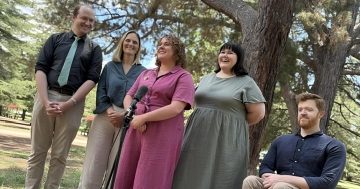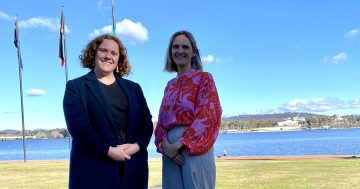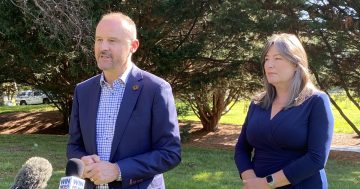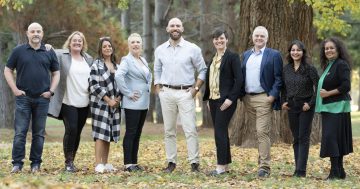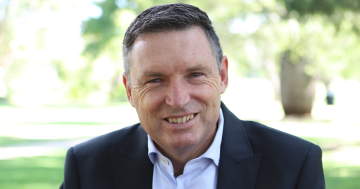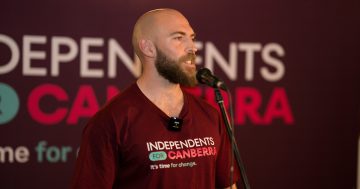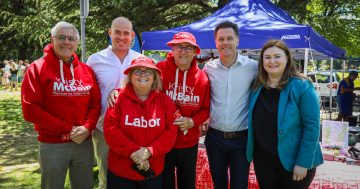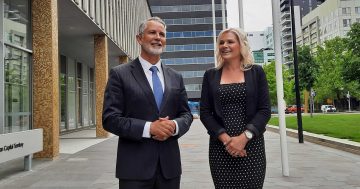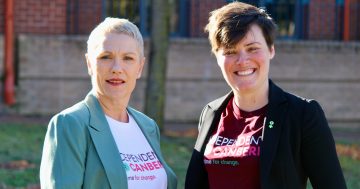
The Secular Party’s Nicolle Burt was our second cab off the rank, thanks Nicole.
Candidates, the readers of RiotACT are your voters and they have questions for you! If you’d like to answer those questions and prove you care what your voters think then email us at contact@the-riotact.com.
You can find the questions here.
1. What are your views on euthanasia?
It is unethical that in this day and age Australians who are suffering through irreversible injury or disease are prevented from undergoing a peaceful and dignified death in the company of loved ones. Each individual should have control over his or her own destiny. Religious lobby groups have repeatedly blocked appropriate legislation on voluntary euthanasia in various states.
It is the policy of the Secular Party that voluntary euthanasia be legalised, at state and federal levels, in cases where the individual is undergoing unbearable suffering with little or no hope of improvement. It is also our policy that this legislation should include adequate safeguards to prevent abuse. This would include, but not be limited to, independent and unbiased psychological evaluation, independent and unbiased medical evaluation, a “cooling off” period, and the right of the patient to change his or her mind at any stage of the process.
2. Do you support a High Speed Rail Link between Sydney/Canberra/Melbourne?
At this point in time, we do not have a specific policy response in this regard. However, in terms of policy direction, we would be likely to encourage a detailed study of the costs, benefits and viability of any proposed high speed rail link.
3. Are you comfortable with the distribution of wealth in modern day Australia?
The Secular Party recognises that the age-old struggle between the forces of labour and capital is no longer the major determinant in political economy. Unlike the major parties, we have no allegiance to the sectional interests of labour or capital. The Secular Party bases its economic policies on judgements concerning the long-term public interest and the interests of global humanity.
In doing so, we are guided by the heritage of the classical economists of the Enlightenment, including both Adam Smith and Jeremy Bentham. The Secular Party is also not so constrained by ideology as to suppose that the macroeconomic management insights established by J. M. Keynes will never again be relevant.
We maintain that balanced government budgets, over the long term, as well as a balanced foreign trade account, are legitimate concerns of government policy.
We recognise that the benefits of capitalism are derived neither by exploitation, nor by the exertion of monopoly power of any kind. Such benefits, as are apparent in the continuous rise in living standards that have been sustained for over two hundred years, are due not to any religion for example, but to what is in fact a humanist phenomenon — technical progress and commercial innovation. The Secular Party has as its core philosophy the development and maintenance of economic policies that support this process.
The major economic challenges that lie ahead derive from international inequity and environmental problems associated with oil resource depletion and global warming. Insufficient provision has been made in Australia for looming environmental problems, especially in terms of water conservation and addressing dry land salinity.
Eliminating Australian and world poverty is a feasible goal, requiring the fostering of aid, trade and good governance, but will not be achieved without a far greater degree of local and international goodwill and co-operation.
We are also most concerned that the continuing and egregious nature of global religious conflict is a severe impediment to achieving the co-operation required. Secular values must be promoted and secular policies implemented far more widely in order to achieve this.
4. Recent polling (Auspoll) shows housing affordability to be a critical issue for a majority of Australians, with 84% of respondents saying it was important to them or their families, putting housing affordability ahead of issues such as education, border security, the NBN and NDIS.
The same poll also revealed that 84% of respondents also believe that Australia is not performing well on housing affordability. Australian Governments are failing badly on this issue of critical importance to Australians.
What would you do to improve housing affordability?
The Secular Party recognises the crisis in housing affordability. We also recognise the need for Government intervention, including the need for the provision of public housing.
We are a very small voluntary organisation and policy development in this area is ongoing, as we believe it to be an important and major issue affecting numerous Australian families. As such, this matter requires the proper research and analysis of the multiple, complex factors that contribute to this problem so we will not be making any major policy decisions or announcements at this point.
5. To me the NBN seems like a great idea, can you tell me why you think it’s ace/a dumb idea.
We don’t as yet have an official policy on the NBN, and will probably not be making any major policy decisions this year again for the reasons given previously. However, in terms of policy direction we do have an unofficial position on the NBN. We believe that Labor’s policy offering fibre to the home is superior to that offered by the Coalition. The reason for this is that we do not feel that the savings suggested by the Coalition’s plan justify sacrificing Australia’s future needs. It is likely to cost more in the long term.
6. Do you think cyclists should be registered?!
Although we don’t have an official policy in this area as part of our federal election platform, we understand that registering cyclists could be viewed by locals as yet another administrative burden placed upon them. In terms of policy direction, we suggest a proper local review by TAMSD would need to be done in order to quantify the costs and benefits of this proposal.
7. What is your position on gay marriage?
Yes…we fully support equal marriage rights in a secular state. It is our view that marriage is “…a voluntary union entered into for life by two people to the exclusion of all others”
8. Would you be willing to cross the floor on matters of strong personal conscience or of significant concern for your electorate?
Given the humanist and sensible views of the Secular Party – being based on the use of reason and evidence in policy development and application – I cannot foresee the need to do so.
9. What are your views on the NSA collecting private information of Australian citizens and corporations, of the Australian government’s participation in similar programmes, and of the apparent silence of Australian politicians on the matter?
We assume that you are referring to the National Safety Agency (NSA).
The Secular Party has not yet developed a specific policy about this particular matter.
However, we have observed that the rights of citizens have been curtailed as a result of the “war on terror”. There is a risk that these laws will produce greater alienation amongst target groups. Citizens therefore need the protection of legislation that protects human rights.
The Secular Party endorses and supports a proposed Bill of Rights Act. The purpose of this act is to formalise in Australia rights that have already been agreed to in international treaties that Australia has signed and ratified. Personal freedoms should be based on modern secular humanist principles and it is our policy that all laws be enacted such that they apply equally to all citizens.
10. We hear so much negativity about the opposition when election time rolls around– what three things do you consider to be positive about any of your opponents and why?
At the personal level, I find that:
1. The larger parties have greater resources, budgets and access to expertise across a wide spectrum of policy environments so I have been in a position to learn from other people’s experiences and mistakes
2. Many candidates have extensive career and other life experiences outside of politics. Some of them are very interesting to talk to and share our common experiences as candidates in the federal election
3. The collegiate atmosphere I have experienced from my interaction with other candidates from other political parties has been very informative.












